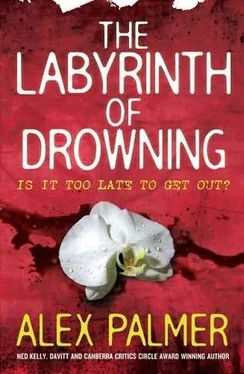Alex Palmer - The Labyrinth of Drowning
Здесь есть возможность читать онлайн «Alex Palmer - The Labyrinth of Drowning» весь текст электронной книги совершенно бесплатно (целиком полную версию без сокращений). В некоторых случаях можно слушать аудио, скачать через торрент в формате fb2 и присутствует краткое содержание. Жанр: Триллер, на английском языке. Описание произведения, (предисловие) а так же отзывы посетителей доступны на портале библиотеки ЛибКат.
- Название:The Labyrinth of Drowning
- Автор:
- Жанр:
- Год:неизвестен
- ISBN:нет данных
- Рейтинг книги:4 / 5. Голосов: 1
-
Избранное:Добавить в избранное
- Отзывы:
-
Ваша оценка:
- 80
- 1
- 2
- 3
- 4
- 5
The Labyrinth of Drowning: краткое содержание, описание и аннотация
Предлагаем к чтению аннотацию, описание, краткое содержание или предисловие (зависит от того, что написал сам автор книги «The Labyrinth of Drowning»). Если вы не нашли необходимую информацию о книге — напишите в комментариях, мы постараемся отыскать её.
The Labyrinth of Drowning — читать онлайн бесплатно полную книгу (весь текст) целиком
Ниже представлен текст книги, разбитый по страницам. Система сохранения места последней прочитанной страницы, позволяет с удобством читать онлайн бесплатно книгу «The Labyrinth of Drowning», без необходимости каждый раз заново искать на чём Вы остановились. Поставьте закладку, и сможете в любой момент перейти на страницу, на которой закончили чтение.
Интервал:
Закладка:
16
Harrigan sat at his desk with his computer on, his window to the net, to the world, open. Spam piled into his in-box: dross, get-rich-quick promises, miracle enhancements and pornography-all of which he erased. Nothing from his mind stalkers, either by email or by phone, which was a relief. Among the rubbish, he saw an email from his retainer with the subject line Jennifer Shillingworth .
Her information was that Jennifer Shillingworth was listed as a missing person. She had disappeared early in 1996 when she was seventy-one. She had been booked in for surgery at the Sydney Adventist Hospital in Wahroonga but had never arrived. Her family didn’t understand this; she’d been on a waiting list for elective surgery for some time and then suddenly, from somewhere, the money she needed for private surgery had arrived. Jennifer had refused to tell them who her benefactor was and had made her own arrangements to get to the hospital. The morning she left home was the last time anyone had seen her.
Reading this, Harrigan thought how all that had been waiting for Jennifer Shillingworth had been her own death. Someone had bought her information and then removed her in case she made the connections public. Naming the property trust they’d created after her must have been their idea of a joke. The whole story read that way, as the nastiest joke in the world. The timing was interesting: a number of years before anyone had approached Amelie Santos. Probably they had been waiting until the doctor was at her most vulnerable before they acted. All of it spoke of careful, long-term planning.
His retainer had also tracked down the Camp Sunshine charity and Ian Blackmore. He had been a youth worker with the charity until it wound up in 1984. After its demise, Blackmore had worked both here and overseas before reportedly committing suicide eight years ago. His sister, one Liz Brewer, would be happy to talk to Harrigan any time he liked if he wanted to go and see her. She lived in Marsfield.
Mid-morning on a weekday, the drive up to northwest Sydney, past Macquarie University, was fairly plain sailing. The house he was seeking was on a large block where the garden was filled with native trees and shrubs. The woman who let him in was in her mid-fifties, shortish, with highlighted hair and the figure some women acquire after menopause, thickening around the middle. They sat down in a large and comfortable if untidy living room. Around him were the trappings of baby-boomer wealth and the accretions of family history. Photographs of parents, children and grandchildren covered sideboards and shelves.
‘I’m very happy to talk to anyone who wants to know about Ian,’ she said. ‘The police were convinced he committed suicide but I didn’t believe that for one moment.’
‘I’m assuming there was no body,’ he said.
‘He walked out of his little rented flat in Cammeray one day and was never seen again.’
There were tears in her eyes.
‘Did he have any kind of partner?’
‘No, he’d had girlfriends but he’d never settled down. Ian was always restless. You know he was a youth worker at Camp Sunshine. The police received an anonymous complaint that he’d molested some of the boys while he’d been there. It was just rubbish! But there was a lot of detail in the complaint, a lot of names. Whoever was behind it must have been there at some stage. Ian reacted badly, got very upset. Camp Sunshine had meant a great deal to him. There was a note in his flat that said he couldn’t deal with the accusations. I told the police that suicide was against everything he’d ever believed in. Apart from that, the complaint had only just been made. You wouldn’t commit suicide straight off. You’d fight it. They wouldn’t listen to me. They’d finished their investigation and that was that. That’s us over there.’
She nodded to a photograph on the wall. An enlarged black and white picture of two broadly smiling teenagers holding a banner, Stop killing children , against the backdrop of a milling crowd, many carrying placards: Stop the War .
‘The May moratorium. You know, in 1970, the protest against the Vietnam War,’ she said. ‘I was nineteen and Ian was seventeen. That was the most amazing day. He was so idealistic. I just can’t see him killing himself.’
‘Can you tell me much about Camp Sunshine?’ Harrigan asked.
‘I actually know quite a lot about it. I used to work there with Ian in the early years. I thought you might want to look at these. Ian kept a lot of his own records, photograph albums, that kind of thing. I got them out for you.’
She had laid out a large number of albums, boxes of documents and folders on the table for him to see; presented them to him almost eagerly.
‘That’s a lot of information,’ Harrigan said. ‘What did the camp do?’
‘Offered activities to underprivileged children, boys and girls, over the summer break. They ran from 1974 to 1983 when the charity closed. Ian was very upset when it happened. One day it was business as normal, and the next day they were shutting the doors.’
‘I’m really interested in just one resident. A boy called Craig Wells. He would have been there probably 1980 or ’81.’
‘I don’t know the name. That was after I stopped going. I had my family by then, I didn’t have the time any more. But the photographs are basically in chronological order. There might be a picture of him.’
Harrigan flicked through yellowing pictures of people otherwise unknown, of interest only to those who had been there with them. All were captioned in amateurish typescript with names and dates. No sign of Craig Wells. Then he came across a picture of a boy of perhaps fifteen or sixteen, sitting by himself and smiling uncertainly at the camera. The caption read: Joel, 1980 .
‘Who’s this?’ Harrigan asked.
‘Joel,’ she said, adjusting her glasses. ‘Yes, I think there’s a note from him to Ian. Just a moment. Here it is.’
She handed Harrigan a letter from a Joel Griffin, a single page written in almost childish handwriting. The date was December 1981, the address a unit in the inner city. A small collection of facts. He was enjoying his job working for a wholesale stationers. His mother was at a new nursing home, Avondale in Burwood, and showing signs of improvement. He was still seeing Sara. She was helping him out with getting his teeth fixed, which was making a big difference to him.
Harrigan looked back at the photograph. Under the yellowing tinge, he saw a small, slight, hunched teenager with dark eyes and light-coloured hair. His chest was thin under his T-shirt, his expression inward-looking, deeply sad. It was difficult to see him growing into the Joel Griffin he’d met.
‘Is there a list of who else would have been with him at the camp?’ Harrigan asked.
She was pleased to help. ‘Definitely. Ian kept that sort of thing. They’re in this box.’
He scanned a handwritten list of names, addresses and ages. Craig Wells was there, the Concord address beside his name. Written in red in the margin next to this were the words Sent home. Harrigan found Joel Griffin’s name. Next to it was a pencilled note and a date from eight years back: Parramatta Court House. Midday. Harrigan looked up and down the list. Several of the names had similar notes beside them: a date with a time and place.
‘What do these mean?’ he asked.
‘That’s Ian,’ she said with a sad smile. ‘He kept up with the kids after they left the camps. A lot of them did quite well and he always felt it was the camps that had given them the edge, particularly the ones who came back each year. He always wanted to know what they were doing with themselves.’
Читать дальшеИнтервал:
Закладка:
Похожие книги на «The Labyrinth of Drowning»
Представляем Вашему вниманию похожие книги на «The Labyrinth of Drowning» списком для выбора. Мы отобрали схожую по названию и смыслу литературу в надежде предоставить читателям больше вариантов отыскать новые, интересные, ещё непрочитанные произведения.
Обсуждение, отзывы о книге «The Labyrinth of Drowning» и просто собственные мнения читателей. Оставьте ваши комментарии, напишите, что Вы думаете о произведении, его смысле или главных героях. Укажите что конкретно понравилось, а что нет, и почему Вы так считаете.












